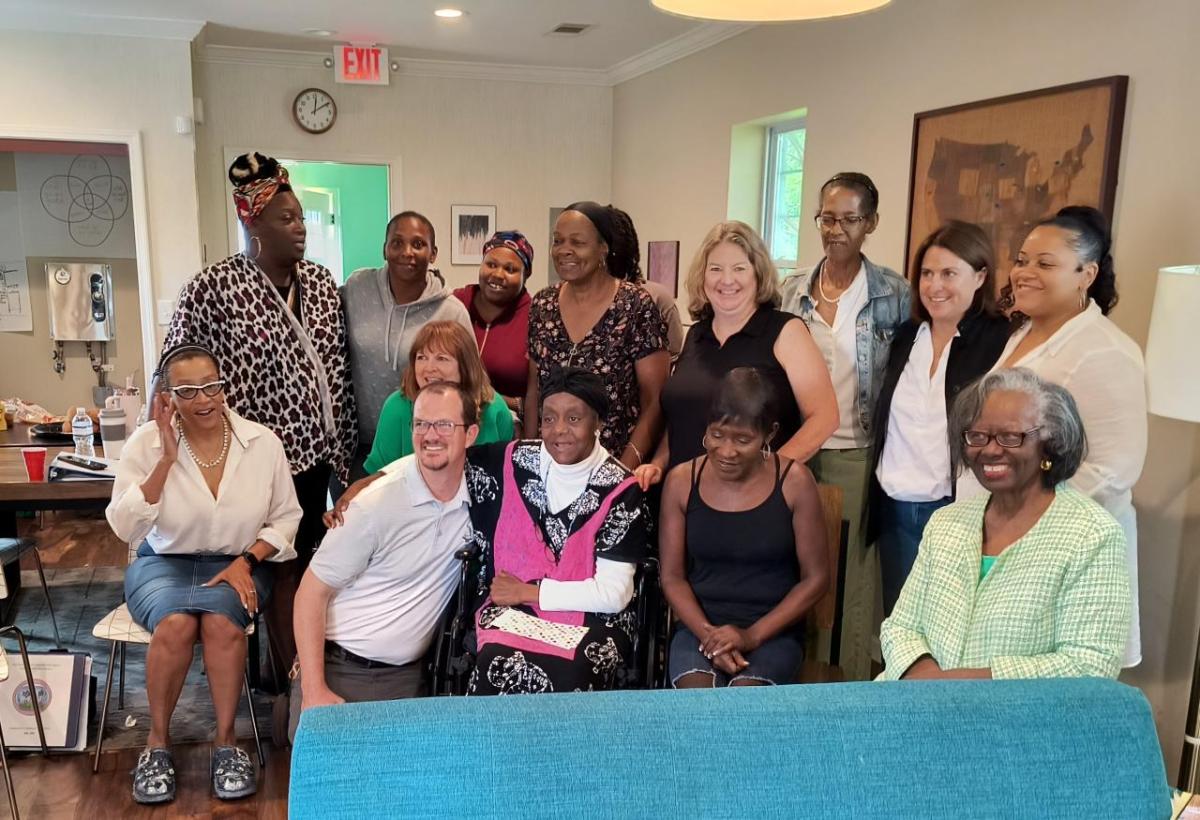Westside Passive Cooling Tree Equity Partnership Addresses Tree Equity and Heat Islands in Atlanta
Drawdown Georgia Climate Solutions & Equity Grants in Action

Representatives from the Ray C. Anderson Foundation and Tull Charitable Foundation recently visited the Green Team of English Avenue (GTOEA) representing all of the Georgia-focused foundations that fund the Drawdown Georgia Climate Solutions & Equity Grants program.
They met with GTOEA founder, Annie Moore, her grant co-applicants from Carinalis Consulting and Research, and Climate Consortium of the Commons, as well as GTOEA's Community Advisory Council, representing Atlanta's English Avenue and Vine City neighborhoods.
GTOEA is an Atlanta-based coalition of resident leaders, community park ambassadors and green space advocates dedicated to improving, monitoring and maintaining the green infrastructure in three city parks. GTOEA empowers residents to act as stewards of their environment and fosters a sense of ownership and community pride by addressing longstanding environmental challenges. Their motto is "of the community and for the community."
GTOEA and their co-applicants received a two year, $200,000 Drawdown Georgia Grant for 2025-26. The grant provides funding for the Westside Passive Cooling Tree Equity Partnership and Project (WPCTEP). The WPCTEP seeks to apply two Drawdown Georgia solutions, Tree Planting and Energy Efficiency, in a unique community driven model that addresses the impact of tree removal on the energy efficiency of residential buildings within the Westside Lead Superfund Site.
The WPCTEP is using its Drawdown Georgia Grant to address inequitable outcomes that have occurred through the EPA's removal of legacy lead waste from the soil. The existing lead is a byproduct of the steel industry that once operated in the area. To date, much of the tree cover that once existed in English Avenue and Vine City has been removed, along with truckloads of topsoil.
The trees and topsoil have been removed without community input, and fill-in material has been "dirt," not soil. As a result, replacement trees cannot be planted, because they will not survive. Common spaces and yards have been destroyed, and additional health concerns related to heat illness have emerged in addition to concerns about lead poisoning.
When the testing and remediation began, the threshold for lead contamination requiring remediation was greater than 200 parts per million (ppm); however, EPA has since raised the threshold to greater than 400 ppm, therefore relaxing the standard for the lead abatement and leaving many homes with lead exposure unaddressed.
Blood tests on children in English Avenue and Vine City have already confirmed the presence of lead exceeding the CDC's blood lead reference value (BLRV) of 3.5 micrograms per deciliter (µg/dL).
The deforestation in English Avenue and Vine City has resulted in a sharp increase in urban heat concentrations, thereby driving up power bills in homes that are already energy burdened, and the concern for resident health continues to increase.
Heat related deaths kill more people in the U.S. than any other type of extreme weather event according the World Meteorological Organization Report.
Since 1999, people aged 65+ have been several times more likely to die from heat-related cardiovascular disease than the general population, while non-Hispanic Black people generally have had higher-than-average rates, according to the EPA's report entitled "Climate Change Indicators: Heat-Related Deaths." See Figure 2.
The WPCTEP aims to leverage the power of community and their grant to:
- Assess the impact of trees removed within the Westside Lead Site on residential energy efficiency and thermal comfort in residences using wireless connected real-time meters that residents will volunteer to wear as they go about their daily activities, inside and outside
- Co-design passive cooling tree planting strategies based on data collected from the meters
-
Demonstrate tree planting strategies as an effective cooling strategy to address energy burdens, which exceed 18% on average.
NOTE: Energy burden is defined as the percentage of gross household income spent on energy costs. It is calculated by dividing the average housing energy cost by the average annual household income. A household with 6% or greater energy burden is considered to be a high energy burden household - U.S. Department of Energy, www.energy.gov
- Create pathways to continue engagement and interaction with land and forest stewards
- Create a replicable plan where other communities with Superfund sites can follow their lead
- Expand the purpose of the WPCTEP and GTOEA to address other key environmental justice issues such as flooding, using nature-based strategies
The Drawdown Georgia grant to GTOEA was funded by a collaborative of foundations with roots in Georgia. Funders for this project include: The Ray C. Anderson Foundation, The Wilbur and Hilda Glenn Family Foundation, Reilly Family Fund, Tull Charitable Foundation, Ghanta Family Foundation and Atticus Fund.

